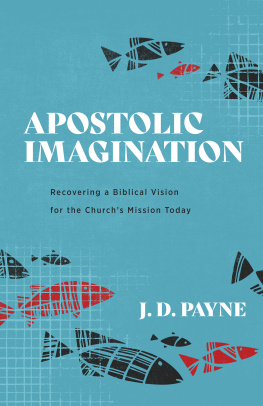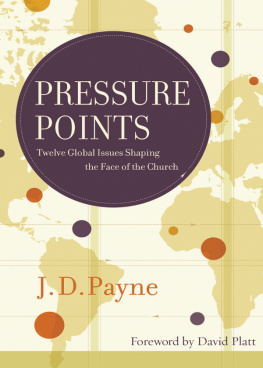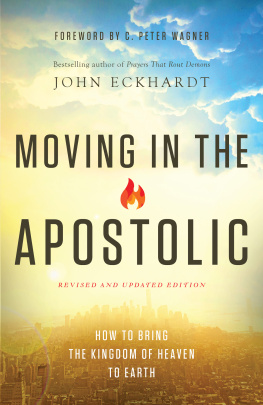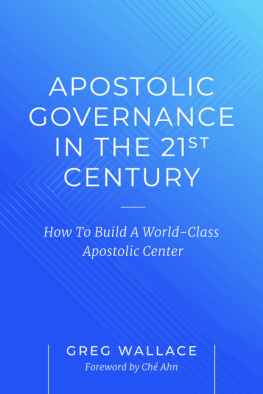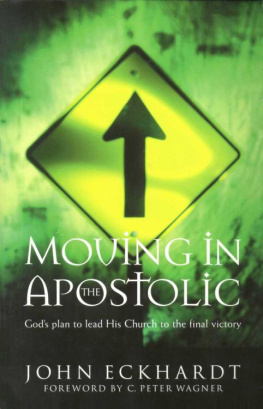J. D. Payne - Apostolic Imagination: Recovering a Biblical Vision for the Churchs Mission Today
Here you can read online J. D. Payne - Apostolic Imagination: Recovering a Biblical Vision for the Churchs Mission Today full text of the book (entire story) in english for free. Download pdf and epub, get meaning, cover and reviews about this ebook. year: 2022, publisher: Baker Publishing Group, genre: Religion. Description of the work, (preface) as well as reviews are available. Best literature library LitArk.com created for fans of good reading and offers a wide selection of genres:
Romance novel
Science fiction
Adventure
Detective
Science
History
Home and family
Prose
Art
Politics
Computer
Non-fiction
Religion
Business
Children
Humor
Choose a favorite category and find really read worthwhile books. Enjoy immersion in the world of imagination, feel the emotions of the characters or learn something new for yourself, make an fascinating discovery.
Apostolic Imagination: Recovering a Biblical Vision for the Churchs Mission Today: summary, description and annotation
We offer to read an annotation, description, summary or preface (depends on what the author of the book "Apostolic Imagination: Recovering a Biblical Vision for the Churchs Mission Today" wrote himself). If you haven't found the necessary information about the book — write in the comments, we will try to find it.
J. D. Payne: author's other books
Who wrote Apostolic Imagination: Recovering a Biblical Vision for the Churchs Mission Today? Find out the surname, the name of the author of the book and a list of all author's works by series.
Apostolic Imagination: Recovering a Biblical Vision for the Churchs Mission Today — read online for free the complete book (whole text) full work
Below is the text of the book, divided by pages. System saving the place of the last page read, allows you to conveniently read the book "Apostolic Imagination: Recovering a Biblical Vision for the Churchs Mission Today" online for free, without having to search again every time where you left off. Put a bookmark, and you can go to the page where you finished reading at any time.
Font size:
Interval:
Bookmark:
2022 by J. D. Payne
Published by Baker Academic
a division of Baker Publishing Group
PO Box 6287, Grand Rapids, MI 49516-6287
www.bakeracademic.com
Ebook edition created 2022
All rights reserved. No part of this publication may be reproduced, stored in a retrieval system, or transmitted in any form or by any meansfor example, electronic, photocopy, recordingwithout the prior written permission of the publisher. The only exception is brief quotations in printed reviews.
Library of Congress Cataloging-in-Publication Data is on file at the Library of Congress, Washington, DC.
ISBN 978-1-4934-3492-3
Scripture quotations are from The Holy Bible, English Standard Version (ESV), copyright 2001 by Crossway, a publishing ministry of Good News Publishers. Used by permission. All rights reserved. ESV Text Edition: 2016
Baker Publishing Group publications use paper produced from sustainable forestry practices and post-consumer waste whenever possible.
To the One
from whom the imagination comes
And to Sarah

Half Title Page
Title Page
Copyright Page
Dedication
Introduction
Part 1: Foundations
1. What Is the Apostolic Imagination?
2. Challenges to the Imagination
3. Apostolic Identity in the New Testament
4. Apostolic Function in the New Testament
Part 2: Reimagining Contemporary Missions
5. Reimagining Language
6. Reimagining Identity
7. Reimagining Priority
8. Reimagining Function
9. Reimagining Location
10. Reimagining Strategy
11. Reimagining the West
Conclusion: A Word to Pastors
Bibliography
Scripture Index
Subject Index
Back Cover
B efore I owned a GPS device or smartphone, I was passing through Nashville one evening traveling to Louisville. It was dark, and I was distracted by the lights of the city and construction signs on the interstate. Thinking I was in the correct lane to continue North on I-65, I somehow ended up traveling Northwest on I-24. I am embarrassed to write this, but I drove the interstate for two hours before realizing I was lost and in the wrong part of Kentucky! The sad truth is I had traveled the three-hour I-65 route from Nashville to Louisville on numerous occasions. Yet, my mind was elsewhere. I was distracted, busy, believing I was traveling the proper path but going in the wrong direction. Eventually I arrived at my destination. Eventually. Unfortunately, matters of distraction and busyness are not limited to my story but have also become part of the Churchs present reality.
During the first three centuries, the Church experienced rapid and widespread growth. The past seventy years also included the Church Growth Movement, the Lausanne Movement for World Evangelization, and the Missional Church Movement, all bearing on the task of the Great Commission.
By the twenty-first century, scholars had produced a wealth of studies on the amazing growth of the Church throughout Asia, Africa, and Central and South America. The Church throughout the Majority World is now both larger and growing faster than the Church throughout the traditionally Western contexts. The new catchphrase: missions is from everywhere to everywhere.
Lack of Clarity
Yet, with all the discussions, publications, and missions taking place, a great deal of confusion remains. The language of mission is unclear. Is missions found in passing out gospel tracts in China or overseeing food distribution in Nicaragua? Is missions fulfilled by church planting in Iraq or constructing a building for a church in Russia? Does missions include all of these examples and others as well? Identity is unclear. Is every Christian a missionary, or only those who relocate their lives to a remote location overseas? Are doctors and teachers actually missionaries, even if they do not share the gospel verbally, or are evangelists the only missionaries? The purpose and priority of missions is unclear. Do missionaries go to serve people with great physical needs? If so, what is the difference between missionaries and any NGO workers? Do missionaries go and share the gospel and do nothing related to social justice? Is priority given to evangelism or meeting social needs? Or, is there no overarching priority, but rather multiple priorities related to the individuals who go and not the Church as a whole? Practices are unclear. What are missionaries to do on the field? Are they to be involved in church-planting activities? Are they to be involved in relief and development? Are they to be involved in training leaders? Caring for the environment? Freeing those captive to human traffickers? Alleviating poverty?
How should funding and sending structures be established? Should the Church spend most of the offering money at home or abroad? Should people be sent to reached or unreached areas of the world? Or are all locations equal? How should pastors lead church members to reach the nations?
People are making inquiries about the Church in the West. Is the West a mission field? If the Church is larger and growing at a faster rate in the Majority World, then how should Western churches consider the future of their kingdom labors? What does biblical partnership look like in the twenty-first century?
My reason for writing this book is because the Church has become lost in the disciple-making task. The Church has ventured away from the apostolic path and continues down a road involving numerous important and good activities labeled as missions. The need of the hour is to ask, What is the apostolic imagination that influenced much of the first-century labors, and how does it affect the Churchs global task today?
Apostolic Imagination
By its very nature, the Christian faith is apostolic. Without this defining element, it ceases to be the Christian faith. The good news of the redemption and restoration of all things in the Messiah was meant to be proclaimed to both Jew and Gentile. While the Church has made missions a complicated matter, such was not the case in the first century. The movement of sending, preaching, teaching, planting, and training was unquestioned in the Scriptures. While challenges arose over matters such as the Gentile inclusion, food distribution, team conflict, and persecution, the Churchs raison dtre and modus operandi were clear.
The disciples had a deep sense of living out the eschatological fulfillment of Gods mission. The last days had arrived, as confirmed with the Messiah and the outpouring of the Spirit (Acts 2:16; Joel 2:2832). The ingathering of the Gentiles had begun in earnest (Acts 13:47; Isa. 49:6). They would glorify God for his mercy (Rom. 15:813), provoking Israel to jealousy until salvation arrived (Rom. 11:1112). The next event on Gods calendar was the judgment and restoration of all things. Now was the day of repentance and faith (Acts 2:20; 17:31). Now was the time to go and share the good news.
A new imagination guided the disciples. Although it was not for them to know the times and season of the restoration (Acts 1:7), they were sent into the world (John 20:21) to give priority and urgency to being a witness (Luke 24:48; Acts 1:8), preaching the gospel (Mark 13:10; 14:9; Luke 24:47), making disciples of all nations (Matt. 28:1820). The evangelization of Jew and Gentile was emphasized throughout the Gospels. Those who came to faith in the Messiah were to be gathered into newly formed kingdom communities and taught how to live the kingdom ethic, which instructed them in their relations with God, other kingdom citizens, and those outside the kingdom. These local expressions of Christs body were to act justly, love mercy, and walk humbly in their societies (Mic. 6:8; cf. Deut. 10:1213). The book of Acts, Pauline and General Epistles, and the Apocalypse testify to a prioritization and urgency of certain tasks found in the apostolic imagination. The God who created was about to restore all things, but the good news was to be communicated throughout the world so that Christ might become wisdom from God, righteousness and sanctification and redemption to those who had not yet heard the gospel (1 Cor. 1:30).
Font size:
Interval:
Bookmark:
Similar books «Apostolic Imagination: Recovering a Biblical Vision for the Churchs Mission Today»
Look at similar books to Apostolic Imagination: Recovering a Biblical Vision for the Churchs Mission Today. We have selected literature similar in name and meaning in the hope of providing readers with more options to find new, interesting, not yet read works.
Discussion, reviews of the book Apostolic Imagination: Recovering a Biblical Vision for the Churchs Mission Today and just readers' own opinions. Leave your comments, write what you think about the work, its meaning or the main characters. Specify what exactly you liked and what you didn't like, and why you think so.

